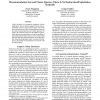Free Online Productivity Tools
i2Speak
i2Symbol
i2OCR
iTex2Img
iWeb2Print
iWeb2Shot
i2Type
iPdf2Split
iPdf2Merge
i2Bopomofo
i2Arabic
i2Style
i2Image
i2PDF
iLatex2Rtf
Sci2ools
AAAI
2011
2011
Recommendation Sets and Choice Queries: There Is No Exploration/Exploitation Tradeoff!
Utility elicitation is an important component of many applications, such as decision support systems and recommender systems. Such systems query users about their preferences and offer recommendations based on the system’s belief about the user’s utility function. We analyze the connection between the problem of generating optimal recommendation sets and the problem of generating optimal choice queries, in the context of both Bayesian and regret-based elicitation. Our results show that, somewhat surprisingly, under very general circumstances, the optimal recommendation set coincides with the optimal query.1 Adaptive Utility Elicitation Preference elicitation is a challenging task for a number of reasons. First of all, full elicitation of user preferences is prohibitively expensive in most cases (w.r.t. time, cognitive effort, etc.) and we must often rely on partial information. Second, many decision problems have large outcome or decision spaces; techniques for elicitation and rec...
| Added | 12 Dec 2011 |
| Updated | 12 Dec 2011 |
| Type | Journal |
| Year | 2011 |
| Where | AAAI |
| Authors | Paolo Viappiani, Craig Boutilier |
Comments (0)

